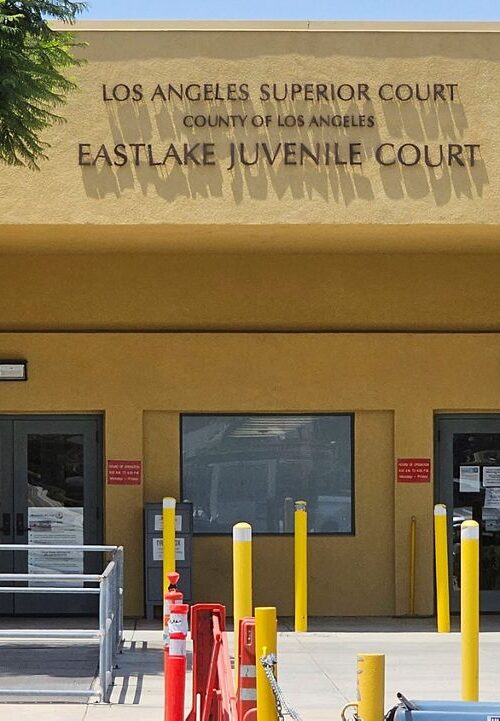Eastlake Juvenile Courthouse OVerview
Court Address:
The Eastlake Juvenile Courthouse is located at:
1601 Eastlake Avenue, Los Angeles, CA 90033
Phone Number:
To inquire about a juvenile case, court schedules, or hearing procedures, contact the courthouse directly at:
(323) 226-8611
Hours of Operation:
The Eastlake Juvenile Courthouse is generally open:
Monday through Friday, 8:30 AM to 4:30 PM
Hours may vary depending on the department or hearing type. We recommend calling ahead or checking the Los Angeles Superior Court website for up-to-date details.
Website:
For court calendars, case lookup, visitation rules, and more information about juvenile proceedings, visit:
Los Angeles Superior Court – Eastlake Juvenile Courthouse
Need Bail at the Eastlake Juvenile Courthouse?
At Armstrong Bail Bonds, we understand the urgency and emotional stress involved when a minor is taken into custody. We provide fast, discreet, and compassionate bail bond services specifically tailored to juvenile cases handled at Eastlake.
Whether your child has been arrested for a first-time offense or is facing a probation violation, our licensed agents are available 24/7 to help you navigate the system and secure their release.
Call us now for immediate juvenile bail assistance:
(818) 241-2171

🏛️ Jurisdiction & Case Types – Eastlake Juvenile Courthouse, Los Angeles
The Eastlake Juvenile Courthouse is a key facility within the Los Angeles County court system that exclusively handles juvenile delinquency cases. Located in the Boyle Heights neighborhood of East Los Angeles, this courthouse oversees legal proceedings involving minors under the age of 18 who are accused of violating the law.
Unlike adult criminal courts, Eastlake Juvenile Court focuses on rehabilitation over punishment, offering minors and their families access to alternative sentencing options, counseling, and community-based programs. That said, serious offenses can still lead to detention, probation, or even transfer to adult court in extreme cases.
Common Juvenile Cases Heard at Eastlake Include:
🔹 Delinquency Matters
Criminal offenses allegedly committed by minors, ranging from low-level misdemeanors to serious felonies. These can include:
- Petty theft and shoplifting
- Vandalism or graffiti
- Simple or aggravated assault
- Drug possession or distribution
- Car theft or joyriding
- Firearm or weapon possession
🔹 Detention Hearings
Held within 48 to 72 hours of a minor’s arrest, these hearings determine whether a child will remain in custody or be released to a parent or guardian while their case is pending.
🔹 Probation Violations
When a minor fails to comply with court-ordered terms—such as curfews, school attendance, drug testing, or counseling—Eastlake Court may review the violation and impose further sanctions or treatment.
🔹 Transfer Hearings
In serious felony cases (often involving minors aged 16 or 17), prosecutors may request a transfer hearing to try the minor in adult court. Eastlake is one of the primary venues for these proceedings.
🔹 Status Offenses
These are non-criminal behaviors that only apply to minors, such as:
- Truancy (skipping school)
- Running away from home
- Breaking curfew
While not technically crimes, these issues can lead to court-ordered supervision or placement in diversion programs.
Whether a minor is facing a misdemeanor graffiti charge or a serious felony allegation, the Eastlake Juvenile Courthouse plays a central role in determining their path forward—through rehabilitation, support services, or formal sentencing. At Armstrong Bail Bonds, we’re committed to helping families understand and navigate these complex legal matters from day one.
How Bail Works at the Eastlake Juvenile Courthouse in Los Angeles
When a minor is arrested in Los Angeles County, including areas near Boyle Heights, East LA, and surrounding neighborhoods, their case is often handled at the Eastlake Juvenile Courthouse. However, the bail process for juveniles is significantly different from what adults experience. Instead of traditional bail, minors go through a detention hearing—and decisions about release are made by a judge, not a preset bail schedule.
The Juvenile Detention Process
Once a minor is taken into custody, they are typically transported to Eastlake Juvenile Hall, which is adjacent to the courthouse. From there:
A detention hearing must be held within 48 to 72 hours
The court will decide whether the minor should be:
- Released to a parent or guardian, or
- Kept in juvenile hall pending further court dates
Unlike adult cases, minors usually cannot post bail immediately after arrest. Instead, their release status is determined by the judge during the detention hearing.
Factors That Influence Juvenile Release Decisions
When evaluating whether a minor can be released, the judge considers several key factors:
Nature and severity of the offense
Prior delinquency history, if any
Flight risk, or whether the minor is likely to run away or skip court
Home environment and parental supervision
Risk to the community or the minor themselves
Can Bail Be Posted for Juvenile Cases?
While traditional cash bail is not common in juvenile court, some serious cases—especially felony-level charges—may lead the court to set a formal bail amount. In those rare cases, Armstrong Bail Bonds is here to help families:
Request a bail amount through legal counsel
Post a juvenile bail bond if approved
Navigate court-mandated release conditions
Even when formal bail isn’t set, our team plays a key role in supporting families through:
Court process education
Connecting with juvenile defense attorneys
Attending detention hearings and advocating for release
Armstrong Bail Bonds – Supporting Juvenile Cases at Every Step
We know that having a child in custody is one of the most stressful experiences a parent can go through. That’s why we provide specialized support for juvenile cases at Eastlake Courthouse, including:
✅ 24/7 Availability – We respond quickly to help families the moment a child is detained
✅ Family-Focused Support – Compassionate, judgment-free guidance throughout the process
✅ Flexible Payment Plans & No-Collateral Options – If formal bail is allowed, we offer affordable solutions tailored to your family’s situation
✅ Court Coordination – We work closely with attorneys and the court to help secure release when possible
Bail Bond Payment Options
If a bail bond becomes necessary, we make the process simple and flexible:
Installment plans with manageable monthly payments
No-collateral bonds available for qualifying families
Multiple payment methods: credit/debit cards, bank transfer, cash, or remote payment options for out-of-area families
If your child has been detained and their case is being heard at the Eastlake Juvenile Courthouse, don’t wait. Contact Armstrong Bail Bonds for fast, compassionate assistance and the experience you need to navigate juvenile court with confidence.


👩⚖️ Court Appearances & Visitation – Eastlake Juvenile Courthouse, Los Angeles
Juvenile Court Appearance Responsibilities
When a minor is released from Eastlake Juvenile Hall—either to a parent, guardian, or through court-supervised release—their case continues through scheduled hearings at the Eastlake Juvenile Courthouse. It’s critical that both the juvenile and their family understand the importance of showing up to every court appearance.
Why Court Attendance Matters:
Juvenile court hearings are essential to the outcome of the case. These hearings may involve:
- Detention review
- Plea agreements
- Probation progress updates
- Sentencing or diversion decisions
Missing a hearing can lead to:
- A bench warrant for the minor’s arrest
- Possible detention until the next hearing
- Stricter probation conditions or court sanctions
To avoid any setbacks, families should:
- Show up early
- Dress appropriately
- Bring all necessary court paperwork or identification
- Communicate closely with your child’s attorney or the probation officer
At Armstrong Bail Bonds, we offer court date reminders and help coordinate with legal teams to make sure you stay informed and prepared throughout the process.
Visiting a Minor in Custody – Eastlake Juvenile Hall
If your child remains in custody while their case is ongoing, they are likely being held at Eastlake Juvenile Hall, which is part of the courthouse complex. Visiting a juvenile in detention has specific rules and limitations.
Visitation Hours:
Visiting times at Eastlake Juvenile Hall may vary based on the unit your child is housed in. Visits typically occur on weekends or scheduled weekdays and must be arranged in advance.
We strongly recommend calling the facility to confirm hours and availability before your visit.
Eastlake Juvenile Hall: (323) 226-8611
How to Schedule a Visit:
- Only parents or legal guardians are allowed to visit (in most cases)
- Visits must be pre-approved and scheduled
- Walk-ins are not permitted
- You may be asked to provide court documents or identification proving guardianship
Visitation Rules & Requirements:
- Valid government-issued ID is required
- Dress code enforced – no revealing or inappropriate clothing
- No phones, bags, food, or personal items allowed inside
- Disruptive behavior can result in visit termination
The goal of these rules is to protect both juveniles and visitors while maintaining a secure environment.
Armstrong Bail Bonds – Helping You Stay on Track
From the moment a minor is taken into custody to their final hearing, Armstrong Bail Bonds is here to help you stay organized, prepared, and supported. We assist with:
- Reminders for court dates and hearings
- Explaining next steps and outcomes
- Referrals to legal professionals, if needed
- Rescheduling hearings (in coordination with attorneys or clerks)
Whether you’re visiting your child in custody or preparing for a critical court appearance, our experienced agents provide the guidance and reassurance you need.
Call Armstrong Bail Bonds anytime for help with court scheduling, visitation, or juvenile bail support.
Common Charges Handled at the Eastlake Juvenile Courthouse - Los Angeles
The Eastlake Juvenile Courthouse processes a wide variety of juvenile offenses ranging from minor misbehavior to serious criminal allegations. While the juvenile justice system emphasizes rehabilitation over punishment, many of the charges handled here can carry significant legal consequences—including probation, court-mandated programs, or detention.
Below are some of the most common charges processed at Eastlake, many of which may require immediate legal representation and guidance from a trusted bail bonds provider like Armstrong Bail Bonds.
Drug-Related Offenses
Drug charges are among the most frequently seen in juvenile court. These may include:
Possession of a Controlled Substance (e.g., marijuana, pills, cocaine, or methamphetamine)
Possession with Intent to Sell – Especially if a minor is caught with large quantities or packaging materials
Possession of Drug Paraphernalia – Such as pipes, vapes, rolling papers, or scales
Even first-time drug offenses can result in probation, counseling, or detention if the court believes there is a pattern of risky behavior.
Theft & Property Crimes
Juvenile theft offenses vary in severity depending on the value of the items taken and the nature of the incident:
Petty Theft – Stealing merchandise or belongings under $950
Burglary – Unlawful entry with intent to commit theft or vandalism
Auto Theft or Joyriding – Taking a car without permission, even temporarily
Vandalism or Graffiti – Defacing public or private property
Many of these cases are eligible for diversion programs or probation, but repeat offenses may result in detention or restitution orders.
Assault & Battery Offenses
Violent behavior involving peers, teachers, or others is taken seriously at Eastlake Juvenile Court. Common charges include:
Simple Battery – Unlawful physical contact that causes harm
Fighting on School Grounds – Including gang-related altercations
Assault with a Weapon – Using or threatening with an object
Battery Causing Injury – Especially if the victim is a school staff member or public official
Depending on the severity and history, these charges may lead to detention, anger management classes, or transfer hearings for more serious offenses.
Firearm & Weapon Offenses
Possession of weapons, especially at school or in public spaces, is one of the more serious charges heard at Eastlake:
Possession of a Firearm by a Minor
Bringing a Weapon to School (knives, tasers, etc.)
Brandishing or Threatening with a Weapon
These cases often involve stricter detention decisions and may trigger transfer hearings for prosecution in adult court.
Domestic or Family-Related Incidents
Juvenile court also handles cases involving altercations or endangerment within the home, such as:
Domestic Battery – Physical conflict with a parent, sibling, or household member
Child Endangerment – Placing oneself or others in risky situations
Violation of Court Orders – Including stay-away orders from family members
Eastlake Juvenile Court may impose family counseling or therapy as part of the case resolution.
School-Related Offenses
Many referrals to juvenile court come from school incidents. Common charges include:
Truancy – Chronic unexcused absences
Disturbing School Activities – Disruptive or violent conduct
Bullying or Harassment – Including social media or cyberbullying-related cases
These are typically handled with diversion programs, counseling, or informal supervision—but can escalate with repeated violations.
Fast Help from Armstrong Bail Bonds – Eastlake Juvenile Court Experts
Whether your child is facing charges for theft, assault, drug possession, or a probation violation, Armstrong Bail Bonds is here to help. We work closely with families, attorneys, and the juvenile court system to ensure the fastest and most supportive path forward.
Frequently asked questions about Eastlake Juvenile Courthouse
What types of cases are handled at Eastlake Juvenile Courthouse?
Eastlake handles juvenile delinquency matters, including offenses committed by minors under 18 such as theft, assault, drug possession, vandalism, and probation violations.
Can minors post bail at Eastlake Juvenile Courthouse?
Juvenile cases generally don’t follow the standard adult bail system. Instead, a detention hearing is held within 48–72 hours to determine if the minor will be released. However, in serious felony cases, formal bail may be set, and Armstrong Bail Bonds can help post it if allowed.
How soon after arrest will a juvenile see a judge?
Minors must be brought before a judge within 48 to 72 hours of being detained (excluding weekends and holidays) for a detention hearing at Eastlake Juvenile Courthouse.
Can parents or guardians attend court hearings?
Yes. In fact, the court encourages parental involvement in all hearings. Parents or legal guardians are usually expected to attend court with their child to support the process and comply with any court-mandated requirements.
What happens if a minor misses a court date?
Failing to appear in juvenile court can result in a bench warrant and possible detention. The court may also modify probation terms or impose stricter supervision.
Can I visit my child if they’re in custody at Eastlake Juvenile Hall?
Yes. Visitation is allowed, but it must be scheduled in advance. Only parents or legal guardians with approved identification can visit. We recommend calling the facility to confirm visitation days, times, and rules.
What are the most common charges seen at Eastlake Juvenile Court?
Typical charges include petty theft, simple assault, vandalism, truancy, drug possession, and weapons-related offenses. The court also handles probation violations and serious felonies that may lead to adult court referrals.
Does Armstrong Bail Bonds help with juvenile cases?
Absolutely. While juvenile bail is handled differently, we assist with detention hearing preparation, court process education, and—when applicable—posting juvenile bail bonds. We also support families throughout the legal process.
What support services are available for minors in the juvenile system?
Eastlake Juvenile Court often refers minors to counseling, educational programs, substance abuse treatment, and diversion programs aimed at rehabilitation rather than punishment.



